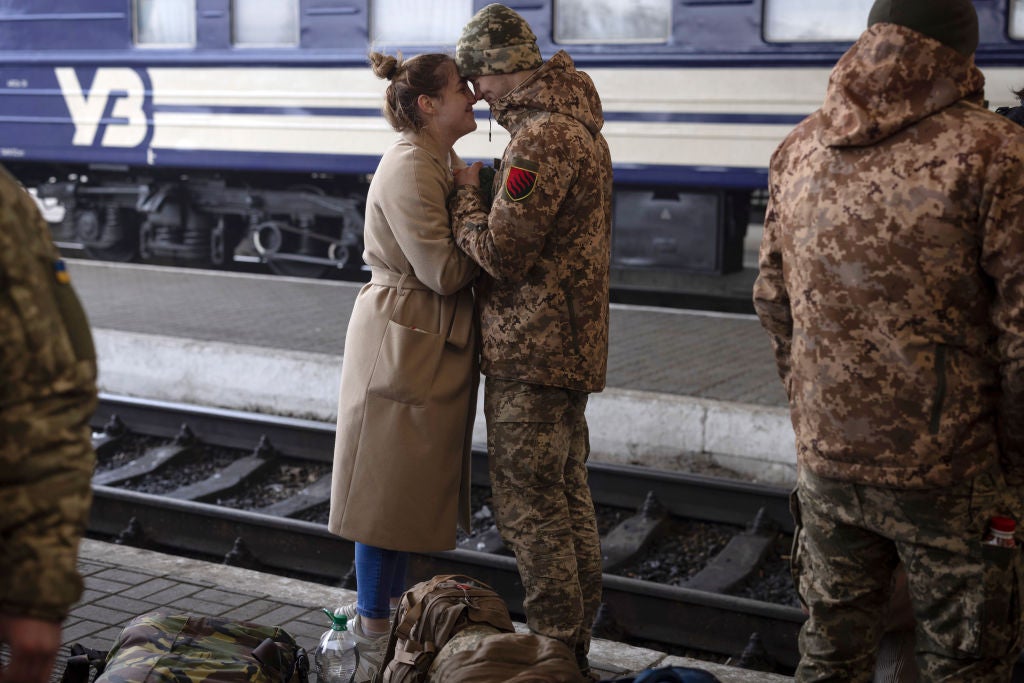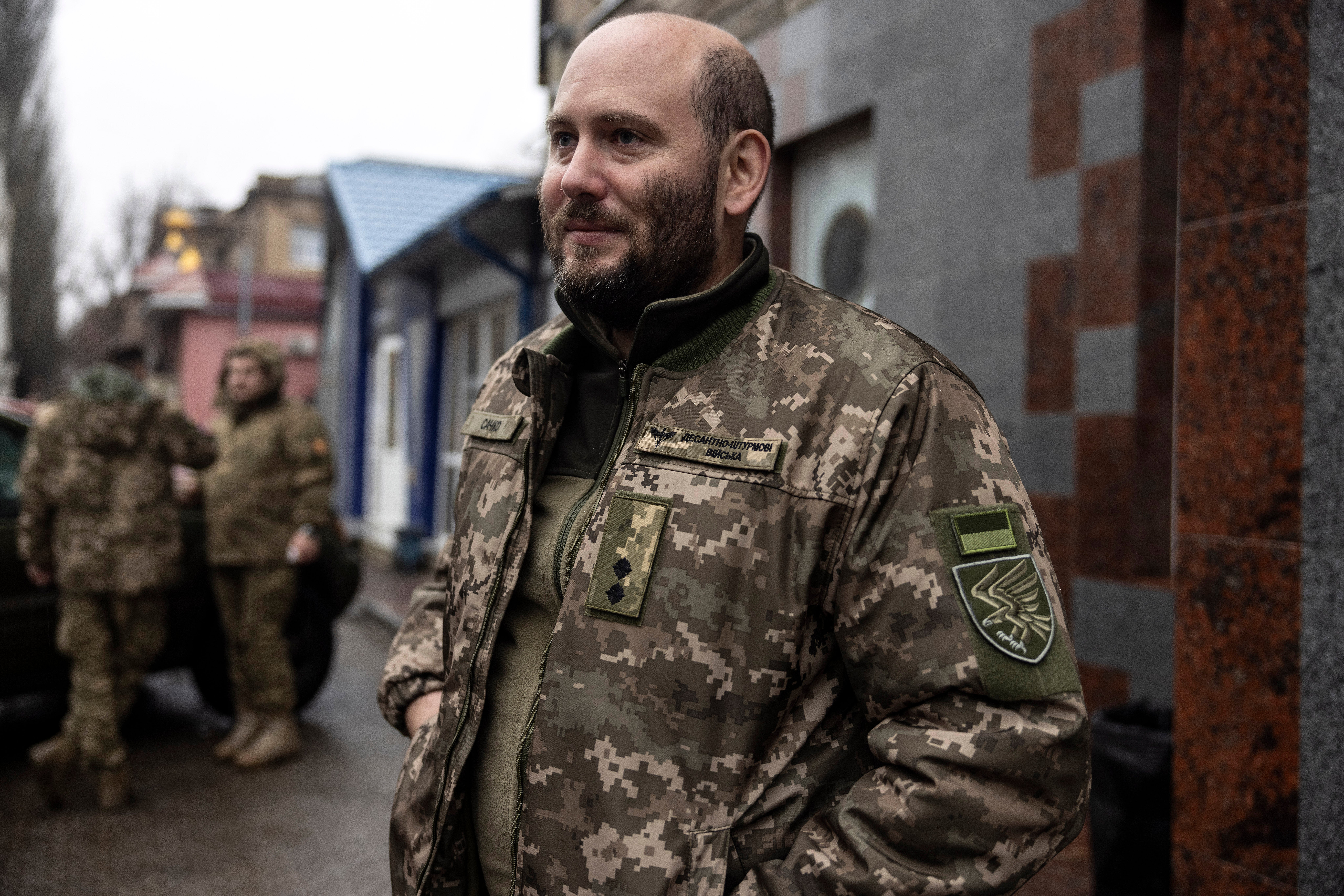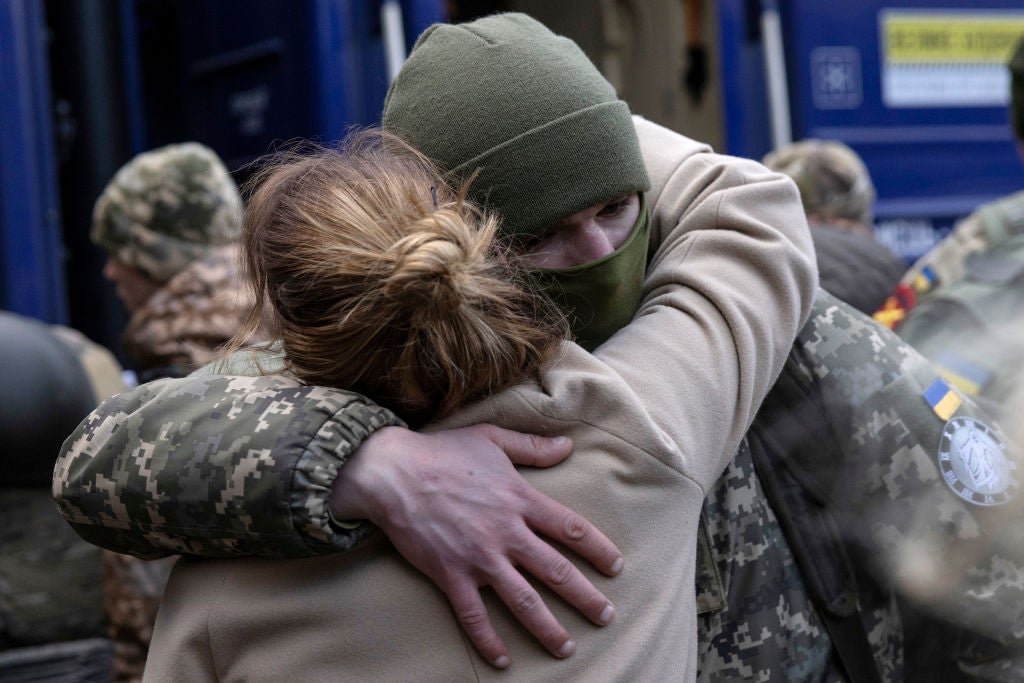How has war changed love and relationships in Ukraine?
The fighting in Ukraine shows that the reality of love during war is far darker than the romances produced by Hollywood, write Jeff Stein, Samantha Schmidt and Kostiantyn Khudov

With his strong build, black hair and easy smile, Vlad had little problem finding about 200 matches on Tinder in Kharkiv ahead of his military unit’s break in the eastern Ukrainian city, as he swiped on the dating app from his position on the frontlines.
It was admittedly a lower number than his halcyon prewar days in Kyiv, when Vlad says he once compiled a record 1,238 Tinder matches. But after nine months in the army, he was excited nonetheless by the prospect of a quick hookup.
When he met his dates at a cafe in Kharkiv, however, Vlad found his normal charm had abandoned him. As his dating profile says, Vlad’s unit is among those fighting in the “grey zone,” part of a territory beyond the front line where the most dangerous operations are conducted. The death and destruction in his daily life weighed on him, and he found himself incapable of the kind of talk that is often the prerequisite for intimacy.
“I did not have the energy to carry a conversation beyond, ‘How are you?’” says Vlad, 30, who spoke on the condition that his last name not be used so he could speak candidly about his sex life. “We start, ‘Hello; how are you?’ – and nothing goes after that. For me, it was a lot of energy to continue this dialogue. I didn’t have it.”
Russia’s invasion of Ukraine has upended nearly every facet of daily life here, creating, to put it mildly, problems that are more urgent than Vlad’s dating life. The country faces an economic collapse. Air raid sirens warn daily of Russian bombardment, and Ukrainian soldiers are locked into a merciless struggle for territory in the east.
But intimacy has been another casualty. Interviews with more than a dozen soldiers, soldiers’ partners, psychologists, sex shop owners and others in Ukraine show that reality is far darker than the wartime romances produced by Hollywood.
“When you’re there, you’re constantly being shelled – there’s constant adrenaline and stress and wounded friends and concussions. You see death, every kind of death, and you can only handle it for so long,” says Kyrylo Dorolenko, 36, a junior lieutenant in the Ukrainian military.
Dorolenko says he and his men sometimes set up dates when given a break from front-line duties. But, he adds, “You don’t have enough time to switch your reality to be gentle, emotional and affectionate.”
Perhaps at the outset of the war there was a kind of thrill to the daring Ukrainian resistance, says Alexander Kolomiychuk, a sex therapist in Kyiv.
It’s a real trauma, and trauma and romance don’t go together. When people are struggling to survive, they don’t think about intimacy, about sex, because it’s about pleasure
That quickly dissipated. What took its place, Kolomiychuk says, was the psychological weight of the war’s innumerable traumas – as many as 100,000 soldiers killed or wounded; more than 5 million Ukrainian civilians forced out of their homes and turned into refugees; more than 10 million now throughout the country facing humanitarian disaster.
“It’s a real trauma, and trauma and romance don’t go together,” Kolomiychuk says. “When people are struggling to survive, they don’t think about intimacy, about sex, because it’s about pleasure, recreation. In war, there is no time for pleasure. There is no time for recreation.”
Soldiers in particular are often forced to numb their feelings in a war zone, says Casey Taft, a professor at Boston University’s School of Medicine who works with veterans and their partners. War forces service members to push away fears, anxieties or depression. And when they return home, they may have a hard time expressing themselves to their spouses or romantic partners, Taft says.

War zone trauma can also cause a sort of “survival mode thinking”, he says.
“You have this heightened sense of mistrust of others,” Taft says. This can sometimes lead veterans to accuse their partners of cheating on them, he says. “When a service member returns home, it’s hard to turn off that survival mode.”
Despite the pall, Ukrainians have found ways to preserve affairs of the heart amid the clatter of war.
At least a handful of Ukrainian soldiers have gotten married while on break, with the matrimony of one decorated female Ukrainian sniper at the front lines circulating widely on social media.

Ukrainian women have fallen in love with some of the foreign fighters who came to Ukraine to join the war against Russia. Many Ukrainians say they have accelerated major life milestones during the war – breakups; engagements; new relationships.
Genia Aslanian, 32, of Kyiv, broke up with her boyfriend, Anton, in 2019 because he wanted to move to Canada to attend flight school there. “We were so spoiled. We were so stupid, and let unimportant things drive us apart. Before, we were like: ‘What about his job, what about my job, what about where we live?’” Aslanian says.
When the war started, Anton returned from Spain to serve as an officer in the Ukrainian military. The two got back together and married, just a few months later.
“We got back together because of the war,” Aslanian says. “The only thing that matters in this war is the people around you and your loved ones.”
More often, though, war serves to widen the distance between partners. Stopping at a coffee shop in Slovyansk on his way to the front lines, Yaroslav Sachko, 43, says he has not seen his wife and children since they relocated to Germany at the beginning of 2022. Now he worries about how she’ll react when they do connect, both in terms of “the physical aspects and the nonphysical aspects.”

“It’s like I never met her. It’s like I’ve never seen her. It’s almost like meeting a stranger,” Sachko says. “We will need to learn each other again.”
At one sex shop in the eastern city of Dnipro, Russia’s invasion and the mass exodus of Ukrainians has done little to diminish sales, according to longtime manager Larysa Goncharova.
While there are fewer sets of lingerie selling – due to the fact that many women left Ukraine – the shop has seen a surge of interest in remote gadgets for couples in long-distance relationships, Goncharova says. Amid the city’s frequent power outages, the store has also seen a boost in sales of products such as toys with LED lights and glow-in-the-dark condoms.
Goncharova offers service members a 20 per cent discount on products. But sometimes it’s the soldiers’ spouses who are her most loyal customers, in anticipation of a rare visit home from the front.
At a different sex shop a few blocks away, a man named Artem was shopping with his girlfriend. The couple met at a party, months after the start of Putin’s invasion. After losing his job as a result of the war, Artem says, his new relationship is the main reason he’s staying in Ukraine.
“You can’t just sit and wait when the lights turn off and when the rockets fly,” he says. “We need to move on, we need to live and we need to love each other. So we’re here.”
Stein reported from Kyiv and Slovyansk. Schmidt reported from Dnipro. Serhii Korolchuk and Ievgeniia Sivorka contributed to this report from Dnipro.
© The Washington Post




Join our commenting forum
Join thought-provoking conversations, follow other Independent readers and see their replies
Comments